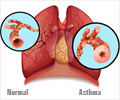African American kids respond differently than African American adults and Caucasian adults and children to step-up treatments for insufficiently controlled asthma, reports a new study.

‘Morbidity from asthma is disproportionately higher among black patients than among white patients.’
Read More..




"Asthma is a tremendously variable disease," said Michael Wechsler, MD, professor of medicine at National Jewish Health and first author. "We need to more closely study subgroups of asthma patients, especially those disproportionately burdened by disease, such as African Americans."Read More..
The researchers evaluated 280 children, ages 5-11, and 294 adolescents/adults of African American ancestry whose asthma was inadequately controlled with low doses of inhaled corticosteroids. Treatment guidelines call for adding a long-acting beta-agonist as the preferred step-up therapy. Researchers several medication strategies - adding long-acting beta-agonists, increasing inhaled steroids alone, and both increasing inhaled steroids and adding long-acting beta-agonists.
The researchers measured response by evaluating several factors, including exacerbations, asthma control days, and lung function. More adult African Americans responded better to adding long-acting beta-agonists (49 percent) versus increasing inhaled steroids alone (28 percent). Caucasians have shown a similar response in previous trials. However, even numbers of African American children responded better to increasing the dose of inhaled corticosteroids along (46 percent) and adding long-acting beta-agonists (46 percent).
"These results indicate that asthma treatment guidelines do not necessarily apply to African American children and that physicians should consider alternatives," said Dr. Wechsler. "We need to do a better job of understanding how different subgroups respond to asthma treatment."
The researchers also looked at several biological and genetic factors to determine if any could predict treatment response. However, they did not find that any biomarkers or percentage of African American ancestry was associated with treatment response.
Advertisement














